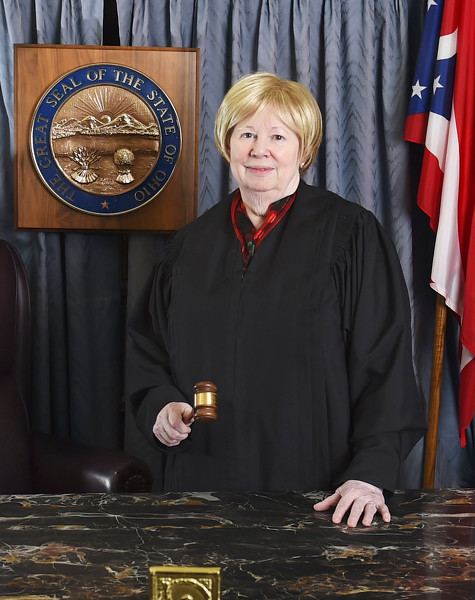Friday, December 18th, 2020
Hanging up her robe
Juvenile court judge Zitter looks back at tenure
By William Kincaid

Photo by Dan Melograna/The Daily Standard
Mercer County Common Pleas Probate/Juvenile Court Judge Mary Pat Zitter is retiring after 18 years on the bench.
CELINA - It doesn't happen often, but when Mercer County Probate/Juvenile Court Judge Mary Pat Zitter learns of an adult who has really made something out of his or her life after previously coming before the court as a child, she sings a little bit inside.
For instance, Zitter recalled how a successful military serviceman, in uniform, stopped by the third floor of the courthouse to thank the judge and probation officers for having given him a push in the right direction years ago when he needed it the most.
"It makes every day worthwhile. Many times we never hear how the kids have done," Zitter told the newspaper. "Really it's the kid who's doing it, not me, not the court. It's the child who finds that in themselves and that utilize that. That is an exciting moment. Everybody up here enjoys that kind of thing."
Such occurrences, along with interacting with children and their families, are the parts of the job Zitter, 73, is going to miss most when she serves her last day in court on Feb. 8. It's not like she's willingly stepping down, though. Ohio law prohibits people from running for a judgeship after reaching the age of 70, something she finds a bit discriminatory given that two men - one 74, the other 78 - recently faced off for the U.S. presidency.
Still, Zitter is not bitter about having to step down, knowing she'll continue to adjudicate as a visiting judge and remain active on Ohio Supreme Court committees.
Reflecting on her 18 years on the bench, Zitter spoke of a memorable run where she learned something new each day - from children, whose perspectives are often unique or more interesting than those of adults.
"I get some of the best kids in Mercer County through my court. I don't think there's three kids I've ever given up on over the last 18 years," she insisted. "There is something good in every child that's ever appeared before me."
In actuality, those who find themselves in her court are good kids who just made a bad decision. That's why Zitter feels her greatest accomplishment was establishing a robust diversion program that offers first-time, non-violent youth offenders the opportunity to do community service in exchange for having charges dismissed.
For instance, under the Ripple Project, children plant, tend to and harvest crops that are then donated to local charities.
"There's got to be a better way to maybe engage kids. Society had changed already a great deal by the time I ran (in November 2002). We were seeing more drugs, things like that," she said about the genesis of the diversion program.
The success of initiatives such as the Ripple Project, exercise program and runners' club - all of which improve a child's self-image and gives them much-needed boost in self-esteem - hinges on the dedication of probation officers.
"I wanted a very active probation department," Zitter said. "I didn't want probation officers sitting in their court offices. I wanted them out interacting with students. I wanted them in the schools. I wanted them in their home. I wanted them out where kids are."
Court officials realize, as frustrating as it might be, that their efforts might not bear fruit for years to come. But they must focus on doing what is best for the child, she said.
"What you do today may not look like it impacted the children or the families today. Those kids might be 30 years old before what we do today really has an impact on their lives," Zitter mused.
Yet regardless of the level of guidance and accountability afforded by court officials, it's ultimately up to each child to decide how to proceed in life.
And sometimes Zitter, in adhering to law, has no choice but to send children away.
"One of the hardest things to do is put a child in the Department of Youth Services. That about kills you inside, and I don't like to put kids in detention," she said. "But you have to do it sometimes."
Asked which aspect of her work she really enjoyed, Zitter immediately pointed to authorizing adoptions, a process that helps create or expand a family.
"Everybody's happy. That day everybody likes you who's in the courtroom. It's a joyful occasion because you get parents and a child," Zitter said.
Zitter's judicial work over the years did not go unnoticed.
She was chosen from among 110 Ohio juvenile court judges to receive a prestigious honor when the Ohio Association of Juvenile Court Judges bestowed its 2016 President's Award to Zitter for "extraordinary contributions to the association and to the system of justice."
Then-association president Kathleen Dobrozsi Romans cited Zitter's "significant contributions to the judicial system in Ohio for juvenile courts" and her vast knowledge and experience as reasons for her being honored.
Romans noted that Zitter has served as association president, vice president, treasurer and secretary since coming onboard in 2006. She also said Zitter "has done so much for us and the various committees" to help further the education of Ohio judges.
Zitter, who was born in Lima and grew up in Pennsylvania and West Virginia, came from a family of lawyers, among them her uncle, Jack McOwen, whom co-chaired John F. Kennedy's presidential campaign in West Virginia and helped start an American Civil Liberties Union chapter in that state as well.
"By the time I was 12, I wanted to be a lawyer," she said.
Zitter was introduced to Mercer County early in her marriage when her husband, Tom, an engineer, was called back to run his family's chicken farm in Sharpsburg.
"I was with Tom and by that time I was expecting our first child, and I just thought it was a beautiful place to live. I just loved Mercer County," she said.
Then very much a city girl, though, she didn't care much for gathering eggs and taking care of baby chicks.
"I did it because that was what we did," she said.
After the couple had started a family, Zitter set out to earn a political science degree from Wright State University and a law degree from the University of Dayton, all while raising a family.
"When I say my husband was a great support, he was an amazing support because at that point in time we had four children," she said.
After earning her law degree in 1983, she set up her own practice in the upstairs office of her husband's business, Big K Mills. At the time she was the only woman with a law office in Mercer County.
"The attorneys in Mercer County as a bar association, very nice, very helpful to a new attorney coming in," she remembered. "I didn't run into any prejudice like some of my classmates that were female."
She moved on to become attorney of the Mercer County Child Support Enforcement and later decided to run for office during the last term of Judge Mark V. Klosterman, who was too old to seek another six-year stint behind the bench.
"I think every lawyer at some point in time says, 'Hey, I could bring something different and something new to the bench,'" she said.


